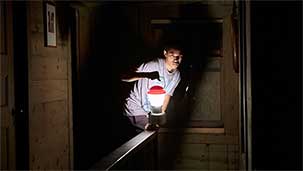It Comes at Night doesn’t fit cleanly into any one genre, but it’s certainly a seat-gripper: a movie that resists simple horror tropes like jump scares and simple-minded monsters, opting instead for psychological drama created almost exclusively through tone. In other words, it’s a film where what we don’t see on screen is much more important than what we do see. And this is where you come in.
Grips are the camera department’s multitalented gophers, doing everything from rigging camera set-ups to orchestrating the lighting design. I took particular note of that latter responsibility in this film. Writer/Director Trey Edward Shults takes full advantage of the low-lighting sensors of modern cameras, using minimal light sources in any given frame in an effort to reflect the post-apocalyptic microcosm of the film’s central location, a boarded-up cabin in the woods. As the characters creep through corridors or dine by candlelight, the black space onscreen (or negative fill, as your department would call it) creates important space for anxiety to proliferate and questions to form. And it’s in these dark corners that the film draws its strength.
Combined with a slow (but never dull) editing pace that withholds information (but never inhibits our interest), the film keeps pulling us deeper into the mentality of a family making choices between staying safe and being moral. Some characters, like the father played by Joel Edgerton, tackle this responsibility with a predictable severity, leaving any grey areas up to his 17-year-old son to navigate. The hierarchy within their home is not all that unlike the way you, Bum, are responsible for helping shape the lighting on set, but aren’t actually allowed to touch the lights themselves (union rules!). You’re complicit in creatingand shaping the darkness, but depend on those in a higher position to let in the appropriate amount of light.
In the case of It Comes at Night, this was more effective at certain times than others. When the characters have a direct lighting source, such as a flashlight mounted to a shotgun or a kerosene lantern, the contrasts are effective and effecting. But in the film’s quieter moments, where feels like only available light is sculpting the scene, the film feels like it has less to say. Even if the story is clearly building towards a specific message. Based on the principles of drama, we know there’s a confrontation coming, but we aren’t sure if it will be from within the house or outside of it. It’s a credit to the performances – and especially Christopher Abbott as the stranger the family meets – that I was almost rooting against the drama, as if I thought everything might just be okay in the end. But as you know, darkness is a powerful force—one that neither you nor Schults obviously shy away from.
Sincerely,

Christopher







